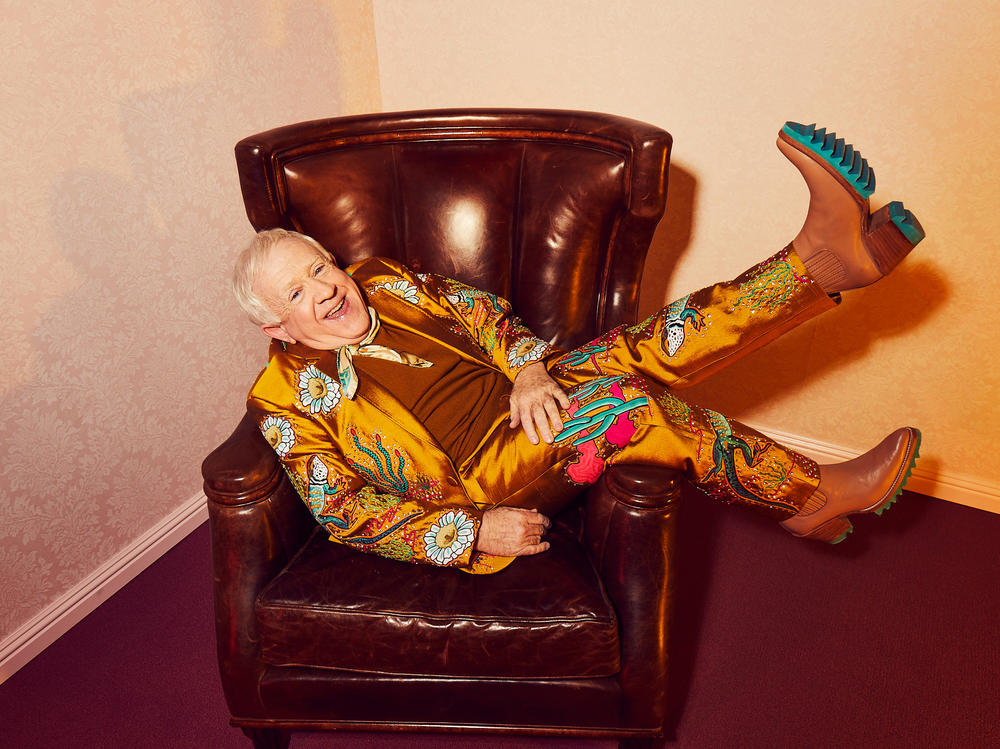Section Branding
Header Content
On 'Company's Comin',' Leslie Jordan And Gospel Greats Sing For Joy
Primary Content
This last year has been dark. For millions of people, Leslie Jordan's voice has been a ray of light. An Emmy winning actor before the pandemic, his quarantine video diaries have shot him to another level of fame.
He has almost six million Instagram followers and, now, he also has branded merchandise, a book on the way and a gospel album: Company's Comin'. The album has duets with some of the biggest names in country music: Dolly Parton, Chris Stapleton, Tanya Tucker, Brandi Carlisle and more.
Leslie Jordan spoke with NPR's Ari Shapiro about his childhood in the church, the songs he heard in the pews and finally meeting Dolly Parton. Hear the radio version at the audio link, and read on for an edited transcript.
This interview has been edited for length and clarity.
Ari Shapiro: So, why gospel music?
Leslie Jordan: I grew up in the church, in the Southern Baptist church. When you grow up in the church, everything that we did — even socially — was around the church. It was just such a big part of our lives. And I loved that music. And then, whatever axe I had to grind with the church as I got older and realized I was a homosexual ... and it's hard to embrace something that doesn't embrace you. So, I wandered away. But over the years you get older and you look back and you think, "Well, you know what. Everybody's doing the best they can with the life they have."
Will you paint a picture for us of what that childhood in the church was like for you? I mean, just describe the experience for us.
We would get up on Sunday mornings and we would get all dressed. I wore a little clip-on tie. And my mother would buy me little outfits — I loved to dress up. Then, we would go and we had what was called a Sunday school, which was the hour of teaching with all the children and the Bible stories and all that. And then we had the morning worship service, which was kind of boring when I was a kid because that preacher – oh, my gosh! He could preach, preach, preach. Anyway, it was a wonderful way to grow up.
Is there a song from those Sunday mornings that you remember hearing in the pews, when you were a kid, that you're doing on this album now?
Almost every single one of them. The one that that that really struck home to me, because it was my dad's favorite song, is the one that we got T.J. Osborne to sing. It's called "In the Sweet By and By," which is just an old, old Southern hymn.
T.J. Osborne recently came out – did you and he talk about your shared experience, growing up gay in the church?
What happened was, we texted a lot. And [his coming out] was a very heartfelt decision, but it was one that he knew he had to make ... I just told him, "I'm here, I'm here."
People ask me, "Well, what was your coming-out experience?" Honey, I fell out of the womb, into my mother's high heels! You know what I mean?
I do remember, at some point, telling people. I told my mother when I was about 12, I thought she might pull out the Bible. That's what I thought would happen ... not at all. Not at all. She was so wise. And I remember her saying, "My fear is that you'll be ridiculed. And I could not bear that. So, maybe you can live just ... a quiet life." So, here I am!
So, alright, can we just talk about Dolly Parton? Because, of all the greats on this album, Dolly Parton is undoubtedly the greatest.
She was in Nashville and I wanted to meet her forever and ever, and she has a guy that travels with her and designs her clothes, Steve Summers. I've told him over the years, "I want to meet her ... I want to meet her so bad." And so he set up a meeting with us.
I was impressed with how smart she is and how present she is and what a businesswoman she is. Even Steve Summers said to me, "Now listen, Dolly takes her music very serious. So, you know, if you want her to sing with you, we've got to play in this. And this is the way it's going to happen and this is the way it's going to do." And la, la, la. And so, we followed the rules – and we were able to apply a lot of those roles to the other artists. It made it a much better experience, because Dolly has done it for so long.
Do you think this album of gospel music you've created might do something for a person who is at the point in their journey you were at a couple of decades ago, when you were feeling more distant from this religion that you felt was not very accepting of you?
I hope that might happen. You know ... I'm going to put it out there. You take away from it whatever you want, because these are old, old hands ... they've been around since the 1800s, some of them. I'm hoping no matter how you were raised — Jewish, Muslim, Buddhist, whatever — you know that you can still listen and enjoy this music. Because it's just like saying, "This is the music of my childhood."
Copyright 2021 NPR. To see more, visit https://www.npr.org.

